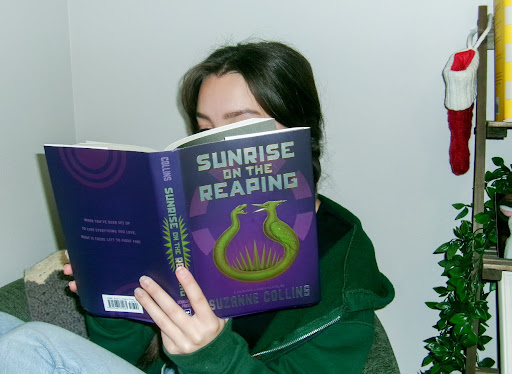Katherine Wymer had a hard time putting her copy of “Sunrise on the Reaping” down. Photo by Abby Kidwell.
ABBY KIDWELL | STAFF REPORTER | arkidwell@butler.edu
“Dawg-Eared” is a book review column that covers books that Bulldogs have requested including popular series, books that have been adapted for the screen and niche books that keep Dawgs turning the pages.
To fans of Suzanne Collins’ “The Hunger Games” series, March 18 was not a typical Tuesday but rather an eagerly-anticipated return to dystopian Panem through the eyes of District 12’s Haymitch Abernathy. “Sunrise on the Reaping” fulfilled the long-held dreams of Collins’ readership by centering around the 50th Hunger Games, in which Haymitch emerged victorious. Bookworms can decide how the latest lore matches up against their expectations now that the purple hardcover is in their hands.
Background
“Sunrise” is preceded by four novels — the original trilogy, which follows Katniss Everdeen‘s arc from the 74th Hunger Games and beyond, and “The Ballad of Songbirds and Snakes”, a prequel that showcases President Snow in the early days of his ascension to power.
Professor of geography Thomas Paradis leads a first-year seminar in which students partake in an in-depth study of the themes and real-life applications within “The Hunger Games” saga. While he was surprised by the announcement of a new book, he was even more surprised that fans were actually getting what they had been emphatically requesting for so long.
“I did not expect a book about Haymitch,” Paradis said. “It’s possible that the fandom and their interests aligned more with Suzanne Collins’ own interests and what she wanted to write this time, but usually, Collins doesn’t placate the fans.”
Haymitch is best remembered as Katniss’ mentor, but before stepping into this role, he first had to survive his own time in the arena. “Catching Fire” offered a brief glimpse into the Second Quarter Quell, which was notable for its particularly brutal nature — instead of sending the traditional 24 tributes to fight to the death, the Capitol required 48. Despite readers believing they knew the gist of Haymitch’s Games from the outset, Collins still elicits shock with every turn of a page.
More than meets the eye
“The Hunger Games” franchise has largely been marketed to young adults, contributing to a widespread devaluation of its literary merit. “Sunrise” makes an impressive addition to the mounting pile of evidence that nothing could be further from the truth.
“Sunrise” stays in step with Collins’ traditional formula for the collection. Each book consists of three acts, begins on reaping day and depicts the lengths Capitol citizens will go to in order to justify their enjoyment of district bloodshed. While Collins incorporated themes of authoritarianism, social contract and propaganda in her previous works, “Sunrise” expertly fleshes those nuances out.
Katherine Wymer, a second-year middle/secondary education and English double major, thought that Collins’ greatest strength is her ability to explain complex theories in a way that is accessible to all audiences.
“She does a great job tackling big philosophical topics and bringing them down to a more digestible level for younger readers,” Wymer said.
For “Ballad”, Collins drew on writings from Enlightenment thinkers Jean-Jacques Rousseau, Thomas Hobbes and John Locke. “Sunrise” features ideas from Scottish philosopher David Hume, who wrote about implicit submission, or “the easiness with which the many are governed by the few.” With this theory as a backdrop to guide readers, the parallels Collins draws between Panem and current society can shine through.
Wymer also noticed an elevation in Collins’ prose within “Sunrise”.
“Suzanne Collins has really refined and narrowed down her writing style and her ability to tell stories,” Wymer said. “There’s much less fluff in the story, and she’s getting to the hard topics immediately.”
While some may feel inclined to criticize the publishing of “Sunrise” as a money grab, others argue that Collins only writes if she feels compelled to share something she thinks the world needs to hear.
Sophomore philosophy-psychology major Daphne Kirby knew before reading that “Sunrise” had the potential to feel monetarily motivated. However, that opinion soon shifted upon flipping the first page.
“[The book] surpassed [my expectations],” Kirby said. “[I was afraid it was] almost like a money gimmick. When they announced the book and the movie [together], I was like, ‘Oh, I’m a little afraid [that] maybe the movie had a lot to do with the book writing.’ But I really feel like this is Suzanne Collins … She’s back.”
What’s next?
On the heels of the initial announcement of “Sunrise” in June 2024, Lionsgate revealed an accompanying film was already in the works and slated for a Nov. 2026 release. The director of the four previous adaptations, Francis Lawrence, is returning for the project, and Collins is currently credited as the screenwriter.
There has also been increasing speculation within the fandom that Collins will release another prequel one day.
“She always does things in threes,” Paradis said. “So why would she not do a prequel series in threes? Unless something happens in her life, or for some reason, she doesn’t have anything else to say — which would be surprising — I think a third book is coming.”
Whether or not Collins publishes more installments, one thing is certain — it is a great time to be a “Hunger Games” fan.
“Sunrise on the Reaping” by Suzanne Collins is available for purchase on all platforms where books are sold.



